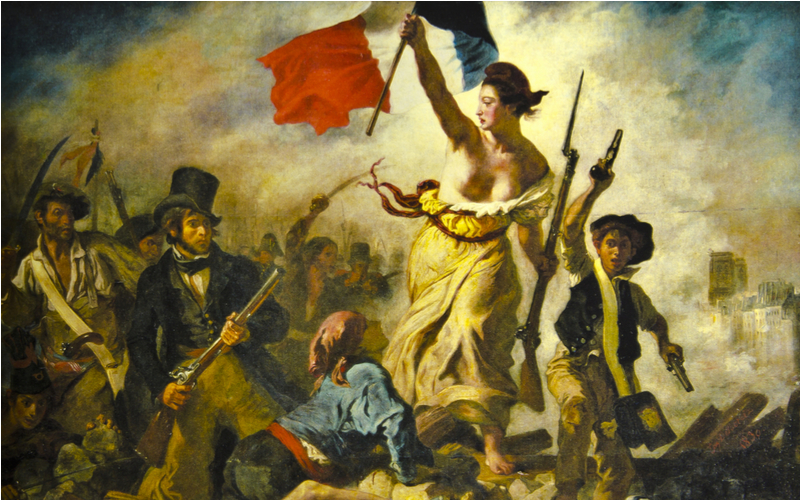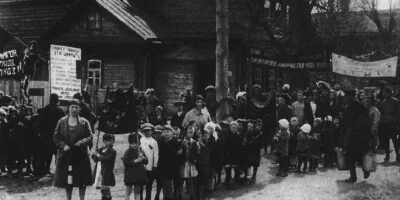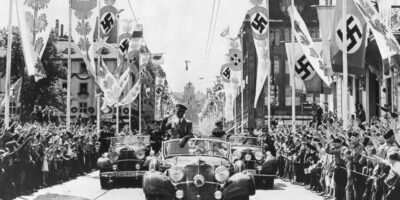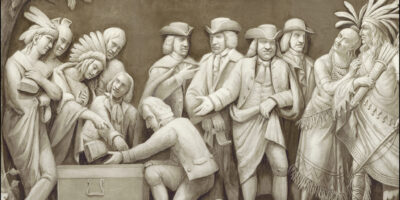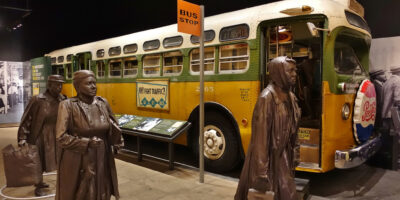What the Word Liberalism Means, If Anything
I’ve spent my last days utterly enraptured with a fantastic new book that casts new light on a personal obsession: the history of the word liberalism. The book is The Lost History of Liberalism by Helena Rosenblatt, professor at CUNY. The sole focus of this work concerns historical etymology. When did the word liberal come along, how was it employed, and what did it mean to those who either embraced or demonized it? So far as I know, this is the first extended study with this focus in mind.
The roots of the word liberalism are ancient (from the Latin liber meaning both free and generous) but the notion of universal freedom was completely unknown. Its use as a political designation traces only to early 19th-century France. She credits Marquis de Lafayette, Madame de Staël, and Benjamin Constant (my personal favorite because even in the interwar years, he was still being attacked by both left-socialists and Nazis). The term gained more traction in the course of the 19th century, with nonstop struggles in French politics, the coalescing of a distinctive English tradition, the rise of a neglected German tradition, and, of course, the persistence of an American liberal idealism.
Purity Lost
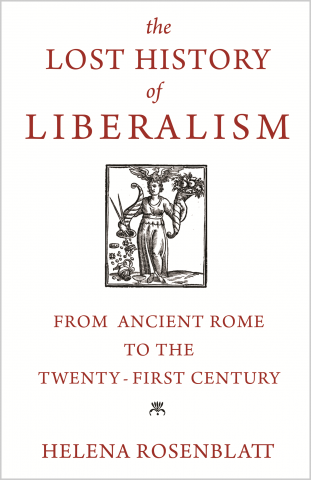
American usage is the most frustrating of all. It’s common for liberals like me to believe that the New Deal wrecked the term but actually the word was already up for grabs following the Civil War, with distinctly illiberal movements claiming the moniker for themselves. By the 1890s, William Graham Sumner was already decrying the eugenic wolves who donned liberal garb while celebrating the rise of egregious forms of state planning. That Woodrow Wilson called himself a liberal demonstrates that something had gone very wrong.
Following World War II, the remnants of the American classical liberals felt the battle for the word was over (Mr. Conservative Robert Taft in 1948 regretted that he couldn’t call himself a liberal), and so Dean Russell in 1956 was first to push forward the world libertarianism (a leftover from the 19th century) as a substitute. But as we’ve seen more recently, with self-proclaimed libertarians drifting left and right – even vacillating on core issues like religious freedom, free speech, and free migration – the attempt to codify political ideology into an immutable dictionary entry proves elusive.
Challenge and Comfort
Those of us who want to believe we are the real liberals might at first balk at these conclusions. For the most part, I find the narrative accurate as far as it goes, insofar as I’m in a position to say. I too would like to read my own version of liberalism back into history, discovering partisans of pure stateless advocacy here, there, and everywhere. This is not sound historical practice. Liberalism is a rather big tent, with points of unity that are a bit too vague to codify with much specificity.
It is best to look at her conclusions as a challenge that might even provide some degree of comfort. The battle to control and define the meaning of liberalism is not new but that in no way suggests we should give up. Even Rosenblatt’s narrative proceeds as if liberalism has some core to it, and the reader gradually comes to realize what it is, even if the author ultimately declines to provide a compelling rendering of what that core really is.
Big Themes
This book is more illuminating in its details of specific historical arguments than in its big themes. A great example is a section on religion. I’ve puzzled for years about the 19th-century Catholic debate over liberalism, not fully understanding what was going on here. When Pope Pius IX condemned liberalism as essentially Satanic, what precisely did he mean? Rosenblatt provides clarity. There is no doubt: the Pope (fearing the loss of political control) was condemning what we think of as liberal virtues: the commitment to religious freedom, the rights of conscience, the freedom of choice. Catholic officials spent the better part of the 19th century resisting the best that modernity had to offer until finally flipping on the whole liberal question with Dignitatis Humanae in 1965.
Rosenblatt’s discussion of the democracy question is also fascinating. Liberalism generally favored democracy over monarchical and aristocratic rule, even while warning against the profound dangers of mob rule exercised through universal suffrage. The result is a constant wavering on many political questions that faced the West after mass prosperity, migration, and the end of religious monopolies melted away old dynasties. Liberalism was warm to democratic forms of selecting state administrators but consistently opposed to populist demagoguery. The two are frequently in tension.
The chronicling of these debates provide the sort of drama I look for in a good work of intellectual history. Where the story is lacking is in big themes. So let me provide something of a meta-summary of the ideological and definitional substance I have taken from her narrative. Liberalism is rooted in the goal of universal human emancipation. It has consistently favored freedom from authoritarian imposition, free trade, freedom of movement, freedom of choice, and the common good of all. It has consistently opposed Caesarism, blood-and-soil rule by entrenched elites, and restrictions on belief and behavior emanating from the individual conscience.
Means and Ends
Liberalism has aspired to achieve social peace, prosperity, and the common good of all, but the means by which that is realized has been in dispute. How can politics be used to achieve liberal goals? The deviations from laissez faire have trended in three general directions. First, the aspiration for people to live a good life has led liberals to be overly sympathetic to social welfare programs that redistribute wealth, in the name of ending cartels of elite control of resources. Second, the desire to leave behind old-world superstitions and traditions that hold people back has led too many liberals to favor the suppression of ecclesiastical power and colonial rule. Third, the worries about populism and mob rule have led liberalism to acquiesce to government monopoly power under certain emergency circumstances.
All of this is true. It is frustrating for those of us who consider ourselves in the camp of Frederic Bastiat and Gustav de Molinari. We “purist” libertarians learn from and have affection for Adam Smith, Alexis de Tocqueville, Thomas Jefferson, Lord Acton, F.A. Hayek, but our hearts sink when we find slippage in their thought, the times when they decline fully to condemn state intervention. Should we think less of them for this reason? Why have our heroes failed to be consistent? This game of searching for purity becomes tediously distracting. The point is to read in the liberal tradition for insight, not search for sainthood, universal agreement, and perfect paragons.
Here is where Rosenblatt’s work really excels. She covers a huge range of history through this one lens, and introduces the reader to thinkers that have been neglected by modern libertarians, people such as Benjamin Constant, John Prince-Smith, William Gladstone, and Charles Montalembert. Frustratingly, she omits amazing writers such as Auberon Herbert, Wilhelm von Humboldt, and Lysander Spooner. In fact, the puzzling omissions could go on for pages but they include William Leggett, H.L. Mencken, Albert Jay Nock, Gustave de Molinari, and the entirety of the Spanish liberal tradition (no Francisco de Victoria or Juan de Mariana). Her final conclusion is some of a letdown: she offers her study in hope of inspiring more liberal self-definition.
Real Liberalism Exists
I don’t think the author intended to leave the reader with a sense that liberalism can mean anything or nothing but I fear that might be the final takeaway. I think this is wrong. So let me attempt to fill in the missing piece, with credit to Hayek’s student Ralph Raico. It was Raico’s lectures on the history of liberalism that introduced me to the historical personality of liberalism and thereby helped me to understand my own political identity. His formulation of the liberal core is as follows: it is the conviction that society contains within itself the capacity for its own self-management. This means that social order requires no overarching authority.
The realization that this is true began to unfold in the late Middle Ages with the end of the religious wars, and gradually unfolded through the centuries to apply to speech, writing, movement, and commercial trade. It was this insight that imposed restrictions on state power, birthed modernity prosperity, built the middle class, abolished slavery, universalized human rights, and gave us a sense of the possibilities of progress. Liberalism did all of this, overcoming the power of right-Toryism and left-socialism, even while only rarely experiencing triumphs in politics. Given its amazing achievements, it’s no wonder that so many of us had an interest in appropriating the term. This alone is a “supreme, if unintended, compliment, the enemies of the system,” wrote Joseph Schumpeter.
American politics today seems ever more a contest between two forms of state control – progressive/socialist and nationalist/fascist – with both sides deploying populist states of mass agitation with the hope of deploying power to achieve their ends. Where are the liberals? Not many even claim the label. The genuine liberals are a small minority. Here is an opportunity for a reassertion of both the term and its core message that society should be left alone to manage itself.

